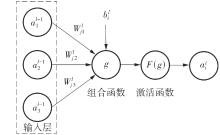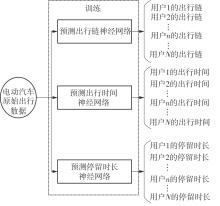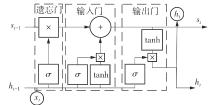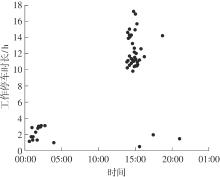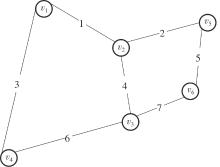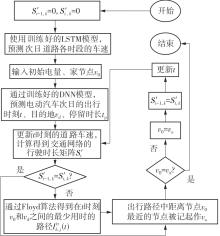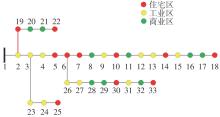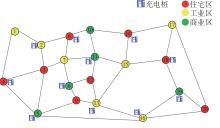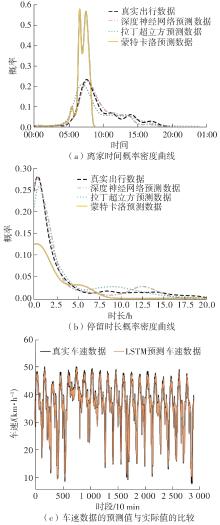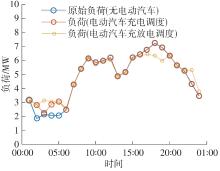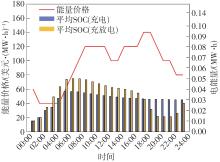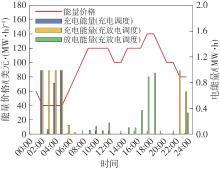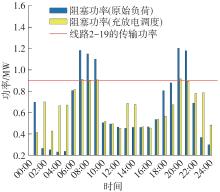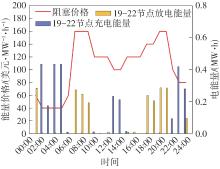Journal of South China University of Technology(Natural Science Edition) ›› 2023, Vol. 51 ›› Issue (12): 83-94.doi: 10.12141/j.issn.1000-565X.220822
Special Issue: 2023年能源、动力与电气工程
• Energy, Power & Electrical Engineering • Previous Articles Next Articles
Scheduling Strategies for Electric Vehicle Participation in Electricity Markets Under Multi-Network Collaboration
DONG Ping WEI Shuyang LIU Mingbo
- School of Electric Power Engineering,South China University of Technology,Guangzhou 510640,Guangdong,China
-
Received:2022-12-21Online:2023-12-25Published:2023-03-30 -
About author:董萍(1978-),女,博士,副教授,主要从事电力市场、电力系统分析运行与优化控制等研究。E-mail: epdping@scut.edu.cn -
Supported by:the National Natural Science Foundation of China(52077083);the Natural Science Foundation of Guangdong Province(2021A1515012073);the Key Technology Projects of China Southern Power Grid(090000KK52210134)
CLC Number:
Cite this article
DONG Ping, WEI Shuyang, LIU Mingbo. Scheduling Strategies for Electric Vehicle Participation in Electricity Markets Under Multi-Network Collaboration[J]. Journal of South China University of Technology(Natural Science Edition), 2023, 51(12): 83-94.
share this article
Table 2
Description of the main parameters and variables of the charge/discharge scheduling model"
| 车辆容量的下限 | |||
| 放电效率系数 | |||
| 充电效率系数 | |||
| t时刻路段k行驶 消耗的能量 | J | 车辆的集合 | |
| t时段i节点预测 放电价格 | |||
| t时段i节点预测 充电价格 | |||
| 电池循环深度段的边际老化成本 | |||
| t时段i节点的允许最大充电能量 | |||
| t时段i节点的允许最大放电能量 | |||
| t时刻在k路段上行驶所消耗的时长 | |||
| 1 | 于保军,于文函,孙伦杰,等 .“十三五”我国纯电动汽车战略规划分析[J].汽车工业研究,2018 (2):40-48. |
| YU Baojun, YU Wenhan, SUN Lunjie,et al .Analysis of China’s pure electric vehicle strategic planning during the 13th Five-Year Plan[J].Auto Industry Research,2018(2):40-48. | |
| 2 | 任泽平,连一席,郭双桃 .全球新能源汽车发展报告2020:百年未有之大变局[DB/OL].(2020-07-28)[2022-12-20]. |
| 3 | TANG D, WANG P .Nodal impact assessment and alleviation of moving electric vehicle loads:from traffic flow to power flow[J].IEEE Transactions on Power Systems,2016,31(6):4231-4242. |
| 4 | LUNZ B, YAN Z, GERSCHLER J B,et al .Influence of plug-in hybrid electric vehicle charging strategies on charging and battery degradation costs[J].Energy Policy,2012,46(1):511-519. |
| 5 | 王锡凡,邵成成,王秀丽,等 .电动汽车充电负荷与调度控制策略综述[J].中国电机工程学报,2013,33(1):1-10. |
| WANG Xifan, SHAO Chengcheng, WANG Xiuli,et al .Survey of electric vehicle charging load and dispatch control strategies[J].Proceedings of the CSEE,2013,33(1):1-10. | |
| 6 | CLEMENT-NYNS K, HAESEN E, DRIESEN J .The impact of charging plug-in hybrid electric vehicles on a residential distribution grid[J].IEEE Transactions on Power Systems,2010,25(1):371-380. |
| 7 | IWAFUNE Y, OGIMOTO K, KOBAYASHI Y,et al .Driving simulator for electric vehicles using the Markov chain Monte Carlo method and evaluation of the demand response effect in residential houses[J].IEEE Access,2020,8(1):47654-47663. |
| 8 | TAO S, LIAO K, XIAO X,et al .Charging demand for electric vehicle based on stochastic analysis of trip chain[J].IET Generation,Transmission & Distribution,2016,10(11):2689-2698. |
| 9 | TANG D, WANG P .Probabilistic modeling of nodal charging demand based on spatial-temporal dynamics of moving electric vehicles[J].IEEE Transactions on Smart Grid,2016,7(2):627-36. |
| 10 | 张谦,王众,谭维玉,等 .基于MDP随机路径模拟的电动汽车充电负荷时空分布预测[J].电力系统自动化,2018,42(20):59-66. |
| ZHANG Qian, WANG Zhong, TAN Weiyu,et al .Spatial-temporal distribution prediction of charging load for electric vehicle based on MDP random path simulation[J].Automation of Electric Power Systems,2018,42(20):59-66. | |
| 11 | 蒋卓臻,向月,刘俊勇,等 .集成电动汽车全轨迹空间的充电负荷建模及对配电网可靠性的影响[J].电网技术,2019,43(10):3789-3800. |
| JIANG Zhuozhen, XIANG Yue, LIU Junyong,et al .Charging load modeling integrated with electric vehicle whole trajectory space and its impact on distribution network reliability[J].Power System Technology,2019,43(10):3789-3800. | |
| 12 | CHEN L, YANG F, XING Q,et al .Spatial-temporal distribution prediction of charging load for electric vehicles based on dynamic traffic information[C]∥Proceedings of 2020 IEEE 4th Conference on Energy Internet and Energy System Integration (EI2).Wuhan:IEEE,2020:1269-1274. |
| 13 | 孙志军,薛磊,许阳明,等 .深度学习研究综述[J].计算机应用研究,2012,29(8):2806-2810. |
| SUN Zhijun, XUE Lei, XU Yangming,et al .Overview of deep learning[J].Application Research of Computers,2012,29(8):2806-2810. | |
| 14 | MALEK Y N, NAJIB M, BAKHOUYA M,et al .Multivariate deep learning approach for electric vehicle speed forecasting[J].Big Data Mining and Analytics,2021,4(1):56-64. |
| 15 | 李彬 .基于深度学习的电动汽车负荷预测研究[D].长沙:长沙理工大学,2019. |
| 16 | 朱俊丞 .基于深度学习的多时间尺度电动汽车充电负荷预测模型设计[D].郑州:郑州大学,2020. |
| 17 | LIN J, DONG P, LIU M,et al .Research on demand response of electric vehicle agents based on multi-layer machine learning agorithm[J].IEEE Access,2020,8(1):224224-224234. |
| 18 | 温剑锋,陶顺,肖湘宁,等 .基于出行链随机模拟的电动汽车充电需求分析[J].电网技术,2015,39(6):1477-1484. |
| WEN Jianfeng, TAO Shun, XIAO Xiangning,et al .Analysis on charging demand of EV based on stochastic simulation of trip chain[J].Power System Technology,2015,39(6):1477-1484. | |
| 19 | 张晨彧,丁明,张晶晶 .基于交通出行矩阵的私家车充电负荷时空分布预测[J].电工技术学报,2017,32(1):78-87. |
| ZHANG Chenyu, DING Ming, ZHANG Jingjing .A temporal and spatial distribution forecasting of private car charging load based on origin-destination matrix [J].Transactions of China Electrotechnical Society,2017,32(1):78-87. | |
| 20 | 严弈遥,罗禹贡,朱陶,等 .融合电网和交通网信息的电动车辆最优充电路径推荐策略[J].中国电机工程学报,2015,35(2):310-318. |
| YAN Yiyao, LUO Yugong, ZHU Tao,et al .Optimal charging route recommendation method based on transportation and distribution information[J].Proceedings of the CSEE,2015,35(2):310-318. | |
| 21 | 杨洪明,李明,文福拴,等 .利用实时交通信息感知的电动汽车路径选择和充电导航策略[J].电力系统自动化,2017,41(11):106-113. |
| YANG Hongming, LI Ming, WEN Fushuan,et al .Route selection and charging navigation strategy for electric vehicles employing real-time traffic information perception[J].Automation of Electric Power Systems,2017,41(11):106-113. | |
| 22 | 侯慧,樊浩,苏舒,等 .多方互利共赢的电动汽车智能充电服务策略[J].电力系统自动化,2017,41(19):66-73. |
| HOU Hui, FAN Hao, SU Shu,et al .Multilateral win-win strategy for smart charging service of electric vehicle[J].Automation of Electric Power Systems,2017,41(19):66-73. | |
| 23 | 程杉,王贤宁,冯毅煁 .电动汽车充电站有序充电调度的分散式优化[J].电力系统自动化,2018,42(1):39-46. |
| CHEN Shan, WANG Xianning, FENG Yichen .Decentralized optimization of ordered charging scheduling in electric vehicle charging station[J].Automation of Electric Power Systems,2018,42(1):39-46. | |
| 24 | 陈奎,马子龙,周思宇,等 .电动汽车两阶段多目标有序充电策略研究[J].电力系统保护与控制,2020,48(1):65-72. |
| CHEN Kui, MA Zilong, ZHOU Siyu,et al .Charging control strategy for electric vehicles based on two-stage multi-target optimization[J].Power System Protection and Control,2020,48(1):65-72. | |
| 25 | GALUS M D, WARAICH R A, NOEMBRINI F,et al. Integrating power systems,transport systems and vehicle technology for electric mobility impact assessment and efficient control[J].IEEE Transactions on Smart Grid,2012,3(2):934-949. |
| 26 | 宋媛媛 .基于行驶工况的纯电动汽车能耗建模及续驶里程估算研究[D].北京:北京交通大学,2014. |
| 27 | LUO Y, ZHU T, WAN S,et al .Optimal charging scheduling for large-scale EV (electric vehicle) deployment based on the interaction of the smart-grid and intelligent-transport systems[J].Energy,2016,97:359-368. |
| 28 | XU B, ZHAO J, ZHENG T,et al .Factoring the cycle aging cost of batteries participating in electricity markets[J].IEEE Transactions on Power Systems,2017,33(2):2248-2259. |
| 29 | 缪鹏彬 .基于改进核密度估计和拉丁超立方抽样的电动汽车负荷模型[D].重庆:重庆大学,2016. |
| 30 | PAPAVASILIOU A .Analysis of distribution locational marginal prices[J].IEEE Transactions on Smart Grid,2018,9(5):4872-4882. |
| 31 | 广东省发展和改革委员会 .关于进一步完善我省峰谷分时电价政策有关问题的通知[EB/OL].(2021-08-31)[2022-12-20].. |
| 32 | 广东省发展和改革委员会 .广州市发展改革委关于电动汽车充电服务费试行收费标准的通知[EB/OL].(2017-01-04)[2022-12-20].. |
| [1] | WEN Huiying, MA Zhaoliang, ZHAO Sheng, WU Liming, HUANG Kunhuo. Analysis of Factors Affecting Truck Accidents on Mountainous Freeways [J]. Journal of South China University of Technology(Natural Science Edition), 2025, 53(7): 93-103. |
| [2] | ZHU Shaopeng, MAO Jingyang, LIU Dongqing, YIN Yuming, CHEN Huipeng, XU Yekai. Design of Acceleration Slip Regulation Multi-Mode Control Strategy of Distributed Drive Electric Vehicle [J]. Journal of South China University of Technology(Natural Science Edition), 2025, 53(6): 44-55. |
| [3] | LIU Wenshuo, ZHONG Mingfeng, ZHOU Bo, LÜ Fangzhou. Research on Temperature Model of Steel Box Girder of High-Speed Railway Cable-Stayed Bridge Based on Machine Learning [J]. Journal of South China University of Technology(Natural Science Edition), 2025, 53(6): 25-33. |
| [4] | BI Jun, WANG Jianing, WANG Yongxing. Short-Term Operation State Prediction of Charging Station Based on LSTM-FC Model [J]. Journal of South China University of Technology(Natural Science Edition), 2025, 53(2): 58-67. |
| [5] | GONG Zhongwen, XIONG Ergang, WANG Wenxiang, et al. Shear Strength Calculation of RC Beams Without Shear Reinforcement Based on Crack Sliding Model [J]. Journal of South China University of Technology(Natural Science Edition), 2024, 52(5): 114-126. |
| [6] | ZHAO Jiandong, XU Huiling, LÜ Xing, et al. Recognition Model of Highway Toll Evasion Behavior Considering Cost-Sensitivity [J]. Journal of South China University of Technology(Natural Science Edition), 2024, 52(5): 10-19. |
| [7] | SHANGGUAN Wenbin, YUE Lian, LÜ Hui, et al. Fatigue Test and Calculation Methods for Battery Package Based on Load Spectrum [J]. Journal of South China University of Technology(Natural Science Edition), 2024, 52(3): 50-56. |
| [8] | ZHOU Chuhao, LIN Peiqun, YAN Mingyue. Traffic Data Imputation Based on Self-Supervised Learning [J]. Journal of South China University of Technology(Natural Science Edition), 2023, 51(4): 101-114. |
| [9] | XU Lunhui, YU Jiaxin, PEI Mingyang, et al. Repositioning Strategy for Ride-Hailing Vehicles Based on Geometric Road Network Structure and Reinforcement Learning [J]. Journal of South China University of Technology(Natural Science Edition), 2023, 51(10): 99-109. |
| [10] | PEI Mingyang, ZHU Hongyu. Modeling Method for Optimizing Dynamic Wireless Charging Lane of Electric Vehicles [J]. Journal of South China University of Technology(Natural Science Edition), 2023, 51(10): 135-151. |
| [11] | LUO Yutao, WU Zhiqiang . Online Joint Estimation of Main States of Lithium-Ion Battery Based on DAEKF Algorithm [J]. Journal of South China University of Technology(Natural Science Edition), 2023, 51(1): 84-94. |
| [12] | WANG Xiaofei, LI Siyu, CHEN Mi, et al. Influence of the Combination Equilibrium of Horizontal and Crest Vertical Curves on Highway Safety [J]. Journal of South China University of Technology(Natural Science Edition), 2022, 50(7): 76-84. |
| [13] | SONG Jian, WANG Wenlong, LI Dong, et al. Injection molding part size prediction method based on Stacking integration learning [J]. Journal of South China University of Technology(Natural Science Edition), 2022, 50(6): 19-26. |
| [14] | LÜ Hui, ZHAO Jiawei, MAO Haikuan, et al. Analysis of the Powertrain Mount Systems of Electric Vehicles by Considering the Correlation of Probabilistic Parameters [J]. Journal of South China University of Technology(Natural Science Edition), 2022, 50(3): 65-72. |
| [15] | ZHANG Xin CUI Yuxuan XUE Qicheng. Torque Coordinated Control Strategy of PHEV Engine Starting in Motion Process [J]. Journal of South China University of Technology(Natural Science Edition), 2021, 49(8): 129-139. |
| Viewed | ||||||
|
Full text |
|
|||||
|
Abstract |
|
|||||
